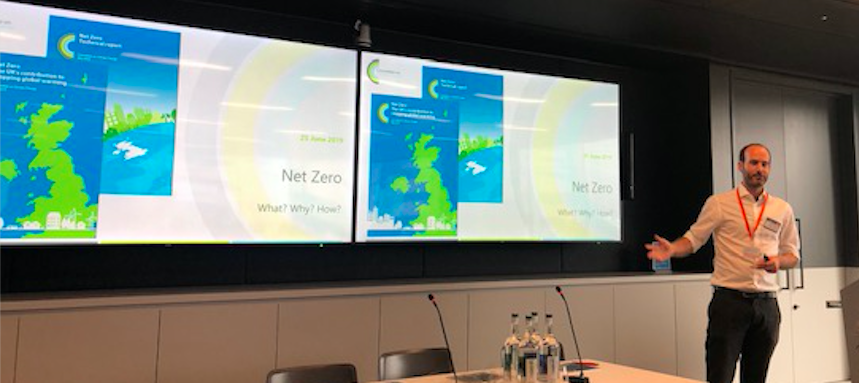UK energy sector is breaking into uncharted territory as it is gradually shifting towards a fully decarbonised model. Power, heat and transport, national systems to local systems, traditional and new assets, as well as innovators and suppliers are seeking to fulfil the potential of the UK’s “smart system” which will be required to deliver a decarbonised economy.
This formed the theme of the Association for Decentralised Energy (ADE) summer conference, which BasePower attended as an active ADE member. Last week, a groundbreaking law was passed in the House of Commons requiring the UK to achieve net zero carbon emissions in a thirty-year time frame. Mike Thompson of the Committee on Climate Change noted the symbolism of the UK being the birthplace of the Industrial Revolution in his keynote speech, which now has the most advanced climate change target in the world.
The recent report published by the Committee on Climate Change sets out the case for Government to realise this goal and reach net zero emissions by 2050. The UK recently ran without coal for two weeks, reflecting that 50% of its electricity supply is already from low carbon sources. However, the supply of clean electricity needs to double and will require a combination of technologies including hydrogen power,, carbon capture and storage, heat pumps and battery storage, as well as significant investment and planning to deliver the ambitious target.
How to Deliver Smart Energy
The conference featured a number of presentations on the innovations in smart systems that will be required to support the new energy landscape. One of the key developments is the increasing use of data to analyse and process energy demand and dispatch in real time. Joe McDonald from LimeJump, an aggregator and technology provider, described how they are currently managing Demand Side Response assets live and entering them in the energy markets; once it reaches a critical mass it may evolve to a full virtual market.
Andy McKay of Evergreen Smart Power, discussed the rapid take up of electric vehicles with a 30% growth rate expected within the next few years. Smart charging will be required to cope with the expected post work surge.. Electric vehicles will also need to be vehicle-to-grid compliant but questions still remain on commercial arrangements for consumers and businesses sending power back to the grid. BasePower believes that CHP technology could play a key role at weaker parts of the electrical grid, which will help to support the roll out of electric vehicles.
With 10,000 properties across the estate, TFL is the largest energy user in London. Alex Gilbert, TFL’s Senior Strategy Manager for Commercial Energy, shared some of its energy efficiency initiatives, which include the electrification of the entire network. He also shared how TFL is increasingly using renewables, using heat from CHP schemes and increasing its use of heat networks..
The Energy Systems Catapult is helping to deliver the UK’s objectives for the transformation of energy systems. There are a number of barriers that need to be addressed to deliver a more user-led energy system according to Guy Newey. He outlined their current project on decarbonising heating in the domestic markets. Their research is considering how householders could be incentivised to move away from conventional boilers to a heating model based on heating as a service model. Delivering a decarbonised economy and a net zero emissions will require fundamental changes to consumer habits, which are both complex and challenging.
BasePower’s vision is that CHP will continue to be an important technology in industrial sectors and will play a more flexible role as the grid moves to a higher percentage of renewables. CHP schemes will be implemented as the initial core technology and then replaced with a more sustainable heat source at the end of their working lives.
To find out how BasePower can help your business reduce energy spend and carbon emissions, contact us today.










